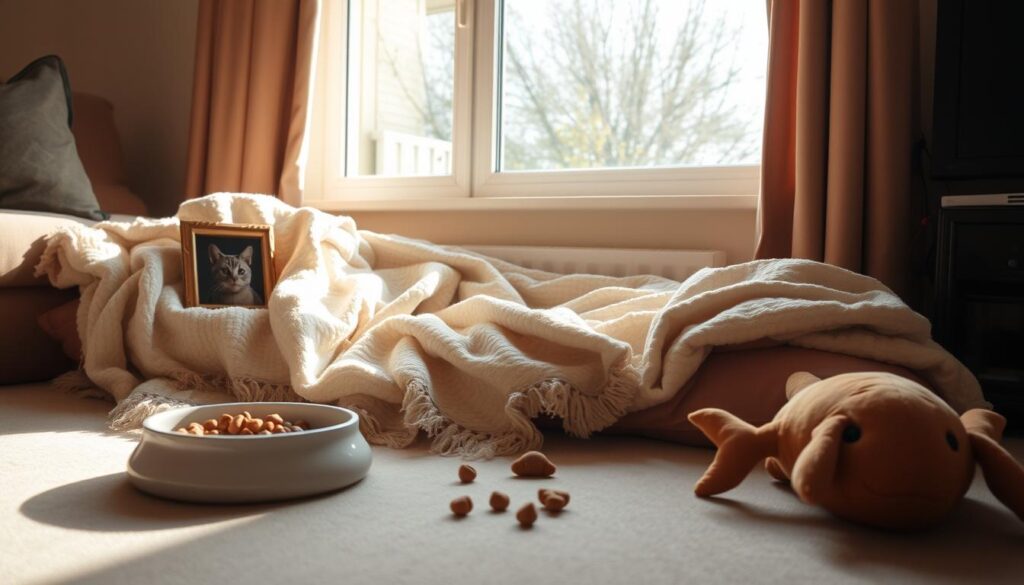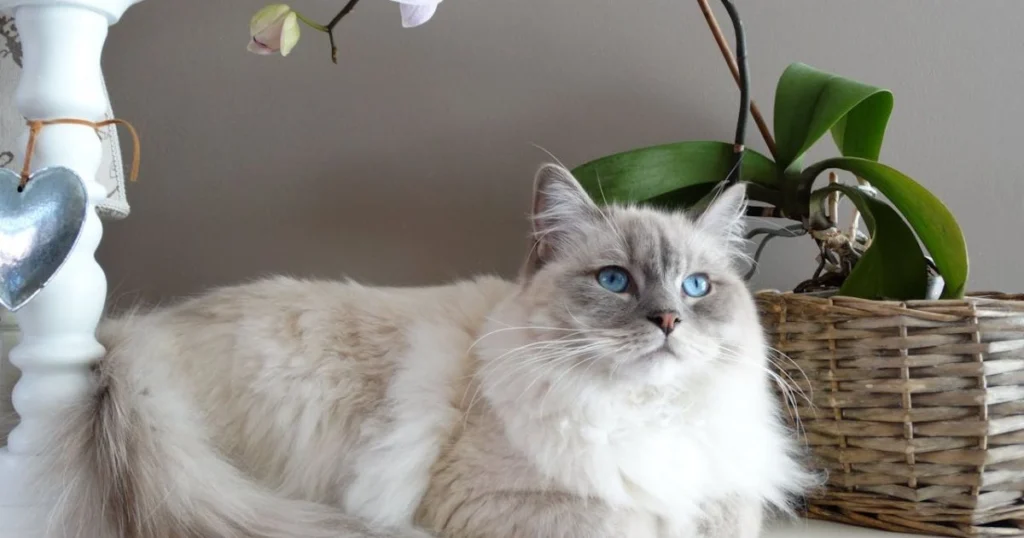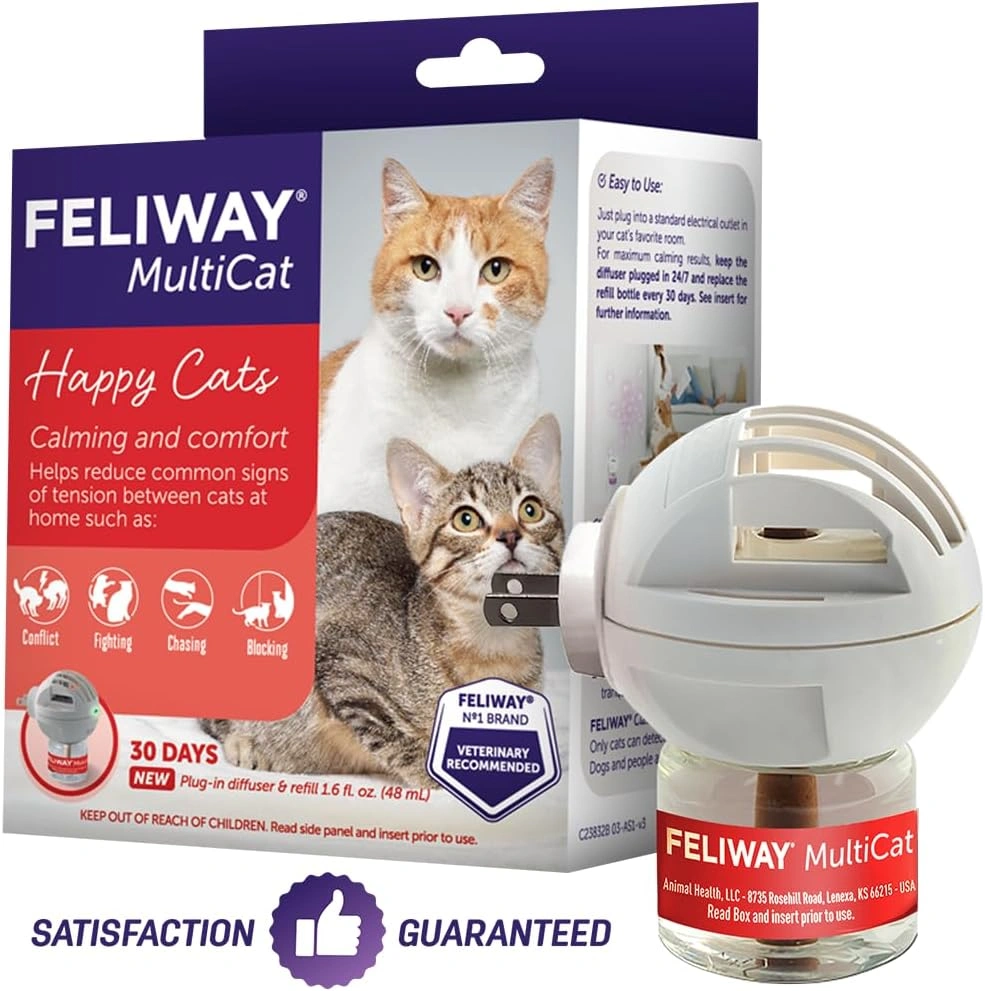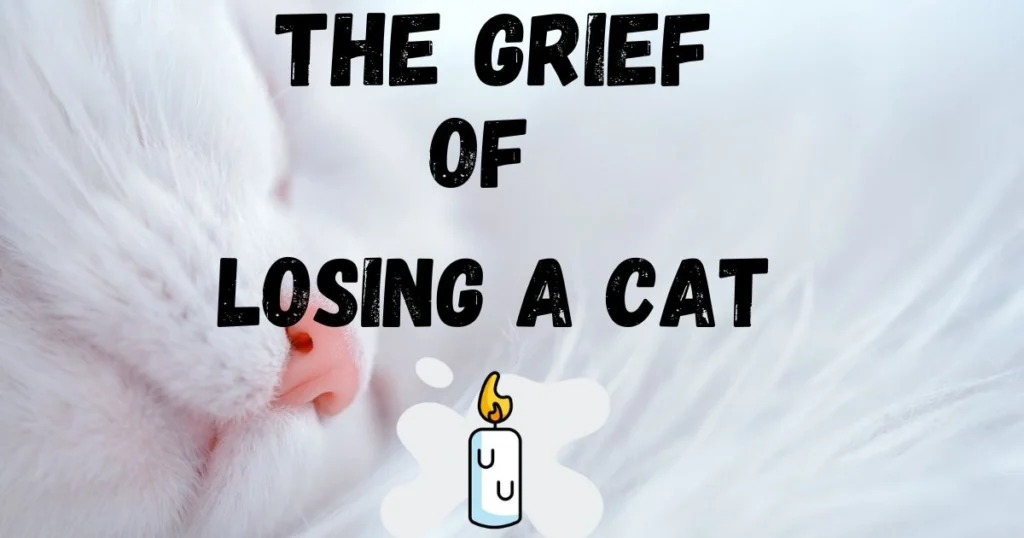Losing a beloved cat leaves a deep scar in our hearts. It’s a pain that resonates in our homes’ quiet corners. As a cat owner, I’ve felt this pain myself. The empty food bowl, the silence, and the missing purr feel like a deep wound.
Yet, we must find the strength to support ourselves and our cats. This guide offers compassionate strategies for cat loss grief, pet bereavement, and helping your feline companion deal with their loss.
We’ll learn to recognize grief in cats and create a supportive environment. This article will provide practical tips and advice. We’ll find ways to honor our pets, heal from pet loss, and strengthen our bond with our remaining cats.
Coping with the Heartbreak of Losing a Feline Companion
Losing a beloved cat is very hard and sad. Cats and their owners form strong bonds. It’s important to help them feel better when they lose a friend.
Recognizing the Signs of Grief in Cats
Cats may act differently when they’re grieving. They might eat less, meow more, hide, or sleep a lot. A study by the ASPCA found that over 60% of pets show four or more changes after losing a friend.
About 30% of cats eat less, and 20% sleep more, a study in New Zealand showed. These changes are signs of grief.
Providing Comfort and Support for Your Grieving Cat
To help your cat, keep their routine the same. This gives them a sense of stability. Giving them extra attention and playing with them can also help.
Remember, grieving takes time. Be patient and understanding. If your cat seems really sad or anxious, talk to a vet. They can help keep your cat’s mind and body healthy.
It’s tough to grieve the loss of a pet, but with kindness and support, you can help your cat. By recognizing their grief and offering comfort, you can keep your bond strong, even in hard times.
Maintaining Routines and Creating a Sense of Normalcy
When you lose a pet, it’s key to keep routines the same for your cat. Regular feeding, play, and sleep times offer comfort. Sticking to these helps your cat feel safe and less stressed.
Cats like things the same every day. Changes can make them feel worse. Keep feeding times, play, and sleep spots the same. This helps them feel secure and less upset.
Also, keep up with your cat’s favorite things like grooming or cuddling. These routines help them feel safe and secure. It lets them deal with their feelings in a familiar way.
| Routine | Importance |
|---|---|
| Feeding Schedule | Provides a sense of security and structure during a time of grief. |
| Playtime Activities | Offers a familiar distraction and helps maintain a sense of normalcy. |
| Sleeping Habits | Allows your cat to find comfort in their usual resting spots. |
Every cat grieves differently. Be patient and flexible as you help your cat through this tough time. Keeping routines the same and creating a sense of normalcy helps your cat feel safe and supported.
Offering Extra Attention and Soothing Interactions
When your cat is grieving, giving them extra attention and soothing interactions can be very comforting. Your gentle petting, reassuring voice, and play sessions can help distract and console them. This is especially important during tough times.
Gentle Petting and Reassurance
Cats often look for physical comfort when they’re grieving. Spend time each day gently petting your cat, speaking softly, and making eye contact. This can calm their anxiety and make them feel secure.
Don’t overwhelm them with too much touch. Let your cat decide how much interaction they want.
Interactive Play Sessions as a Distraction
Playing with your cat can be a great way to give them a break from grief. Use their favorite toys, like feather wands or catnip toys, for play. This can help them focus on something else and feel more normal.
Every cat grieves differently, so watch for their cues. Adjust how much attention and interaction you give them. With patience and compassion, you can help your cat through this tough time.
Providing a Safe Space for Your Cat to Grieve
When you lose a beloved cat, it’s key to make a safe space for your cat to grieve. Cats need a quiet, familiar spot to feel their emotions. They should be away from loud places to avoid feeling anxious.
Think about setting up a cozy “safe space” for your cat. This could be a soft bed or a quiet corner in your home. Make sure it’s not too busy and is peaceful. Add familiar scents like their favorite blanket or toys to make them feel safe.
Let your cat go to this special place when they need to grieve alone. Don’t try to make them happy or interact with them too much. Let them decide when they’re ready to be with you again. This safe space helps your cat grieve without too much stress.
Creating a cat grief sanctuary means giving your cat a comforting environment for pet loss. It lets them feel secure as they deal with their loss. With patience and understanding, you can help your cat through this tough time.
Monitoring Your Cat’s Health and Well-being
Dealing with the loss of a beloved cat is tough, both emotionally and physically. Pet grief can impact health, so it’s key to watch your cat closely during this hard time.
Look out for changes in your cat’s eating, drinking, and mood. If they eat less, seem tired, or change their grooming, it could be physical symptoms of cat grief. If you see any big changes, see your vet to check for health issues that might be making your cat sadder.
Consulting a Veterinarian for Physical Health Concerns
Going to the vet can be a big help during the pet grief process. They can spot health problems and suggest vet care for grieving pets. This way, your cat gets the care and comfort they need.
- Up to 70% of cats can show signs of grief following the loss of a companion
- Cats are more likely to exhibit distress through changes in grooming routines or bathroom behaviors
- Approximately 50% of surviving pets in a multi-pet household may experience conflicts or behavioral changes when one companion passes away
Working with your vet is crucial to keep your cat’s health and happiness first. With the right support and care, your cat can get through the grieving process and find comfort soon.
Utilizing Familiar Scents and Reminders of the Deceased Cat
When a beloved feline companion passes away, the grief can be overwhelming. Finding comfort in familiar scents and reminders can help ease the pain. Cats rely on their sense of smell to feel secure. Keeping items with your cat’s scent can provide a sense of familiarity and security.
Keep your cat’s bedding, toys, or personal belongings in their usual spots. The familiar scents can help your cat adjust to the loss. Creating a memorial space or shrine for your beloved cat can also be comforting. It provides a special place for your cat to visit and grieve.
Incorporating your cat’s scent into the environment can be done with essential oils or pheromone diffusers. These can create a calming and familiar atmosphere. Try scents like their favorite treats or the fragrance of their fur to find comfort.

By using familiar scents and creating memorials, you can provide comfort for your grieving pet. These simple gestures help your cat navigate the loss. They maintain a connection to their beloved companion, easing the transition during this challenging time.
cat loss grief: Coping with the Pain of Losing a Feline Friend
Losing a beloved cat is a tough and emotional experience. As a pet owner, it’s key to face and deal with your sorrow. Disenfranchised grief, where your pain is not taken seriously, can make things harder.
It’s normal to compare your grief to others, which can make you feel inadequate. But remember, your grief is real and deserves respect and support.
A strong support system is crucial in coping with your loss. Ways to help include acknowledging their pain, sharing memories, and listening to their feelings without avoiding the topic.
Practical help, like offering assistance with daily tasks or providing specific help, is also very helpful. Creating a memorial for your cat can be a meaningful way to honor them.
Remember, everyone grieves differently, and it’s okay to take your time. Seeking help from grief counselors or pet loss groups can be very helpful.
The pain of losing a cat may feel overwhelming, but with patience and support, you can heal. Your cat’s love and companionship will always be in your heart.
Considering Feline Companionship and Introducing a New Cat
Losing a beloved cat can be very hard. For some, getting a new cat might help ease the pain. But, it’s important to think carefully before making this decision. Make sure the timing and how you introduce the new cat are done with care.
Timing and Gradual Introduction
It’s key to wait until your cat has adjusted to the loss before getting a new one. Rushing can be unfair to your cat and slow their healing. Give them time to heal before bringing in a new pet.
When you think it’s the right time, introduce the new cat slowly. Don’t push them together too soon. Create a calm space where your cat can get to know the new one at their own speed.
Getting another cat after loss and introducing new cats to grieving ones is delicate. But, with patience and care, you can help make the transition smoother. Remember, the decision to adopt a new pet after loss depends on your emotional readiness and situation.
“The decision to adopt a new cat after the loss of a previous one ultimately depends on the individual’s emotional readiness and circumstances.”
Whether you introduce a new cat now or later, focus on your cat’s well-being. Create a supportive environment during this time of change and healing.
Using Pheromone Products to Create a Calming Environment
When your cat is grieving, a soothing environment can help a lot. Pheromone products, like Feliway, are great for this. They release calming pheromones that cats naturally make. This helps reduce anxiety and makes your cat feel safe.
Feliway offers collars, diffusers, and sprays to comfort your cat. These products mimic the pheromones mother cats use to calm their kittens. Studies show that up to 93% of cat owners see a calming effect in their pets.
Other products, like the Comfort Zone Cat Calming Diffuser, can also help. These diffusers cover up to 700 square feet. They can reduce stress and tension, especially in homes with multiple cats.
Remember, every cat is different. What works for one might not work for another. Talking to your vet can help find the best product for your cat.

Using pheromone products can make a big difference in your cat’s emotional health. They can help reduce stress and unwanted behaviors. This creates a safe space for your cat to grieve.
Allowing Time and Patience for the Grieving Process
Grieving the loss of a feline friend is a personal and unpredictable journey. It’s important to be patient and let your cat grieve at their own pace. Every cat’s grief timeline is different, so don’t rush them or expect them to follow your schedule.
Loss of a pet can feel as deep as losing a human. Cats may go through stages like denial, anger, sadness, bargaining, and acceptance. Showing compassion and understanding these varied reactions is key.
Don’t ask insensitive questions like “When will you get another cat?” These can make your cat’s feelings seem less valid. Instead, create a supportive space where your cat can grieve naturally. This might mean using familiar scents, keeping routines, and offering comfort through touch and play.
“The grief responses to pet loss can be just as intense as those experienced when losing a human loved one.”
The grieving process is not straightforward, and your cat’s feelings may change. They might feel sad, regretful, or even relieved. It’s crucial to challenge negative thoughts and seek help from pet loss counseling or support groups.
By being patient and understanding, you can support your cat through this tough time. With time, your cat will heal, and you can rebuild your bond. Cherish the memories of your beloved feline friend together.
Encouraging Normal Activities and Positive Reinforcement
When your cat loses a friend, it’s key to keep them active. This helps them feel normal and safe. Use treats and praise to encourage them to do what they love.
Interactive Feeding and Mental Stimulation
Interactive feeding and games can also help. Engaging grieving cats in these activities can lift their spirits. It gives them a break from sadness and offers positive reinforcement for pet loss.
- Try puzzle feeders or toys that make getting food fun. It’s good for their mind and body.
- Bring in new toys or swap out old ones to keep their mind sharp. It fights boredom and stress.
- Play games like chasing a wand or laser pointer. It helps them release energy and feel safe.
By keeping your cat active and rewarding them, you support their mental health. With patience, you can strengthen your bond with them.
Conclusion: Supporting Your Cat Through Grief and Strengthening Your Bond
Losing a beloved cat is hard, but you can help them through it. By being patient, understanding, and supportive, you can ease their pain. This way, you can also grow closer to your cat, keeping their memory alive.
Helping a grieving cat involves many steps. Keep their routine, give them extra love, and let them have a safe space to grieve. Also, watch their health, use familiar smells, and think about getting a new cat. These actions can make them feel better and more comfortable.
Remember, grieving takes time, so be patient with your cat. Encourage them to do things they love and praise them when they do. This will help them feel better and strengthen your bond. By supporting your cat and understanding their needs, you honor their memory and grow closer together.
FAQ
What are the common signs of grief in cats after the loss of a feline companion?
Cats show grief in their own special ways. Look for changes in their behavior. These can include eating less, meowing more, pulling away, and feeling very tired.
How can I provide comfort and support to my grieving cat?
Keeping things familiar is key for a grieving cat. Give them extra love, playtime, and attention. Also, make sure they have a cozy, safe spot to retreat to.
What can I do to help my cat cope with the loss of their feline companion?
Keep items with the scent of the lost cat around. This can comfort them. Creating a memorial or special space for the lost cat can also help.
How can I support my own grief as a pet owner while also caring for my grieving cat?
It’s vital to deal with your own grief. Let yourself feel and process your emotions. You can do this by writing, sharing memories, or talking to a counselor or support group.
When is the right time to introduce a new feline companion to my grieving cat?
Introducing a new cat needs careful planning. Wait until your cat has adjusted to the loss. Then, introduce the new cat slowly to avoid stress.
How can pheromone products like Feliway help my grieving cat?
Pheromone products, like Feliway, can make your cat feel more at ease. They help reduce stress and anxiety. This can support your cat’s well-being during the grieving time.
How can I help my cat engage in their regular activities and routines during the grieving process?
Encourage your cat to do their usual things. Use treats and praise to make them feel good. Interactive toys and feeding can also help them feel better.

FELIWAY MultiCat Calming Pheromone Diffuser, 30 Day Starter Kit (48 mL)

